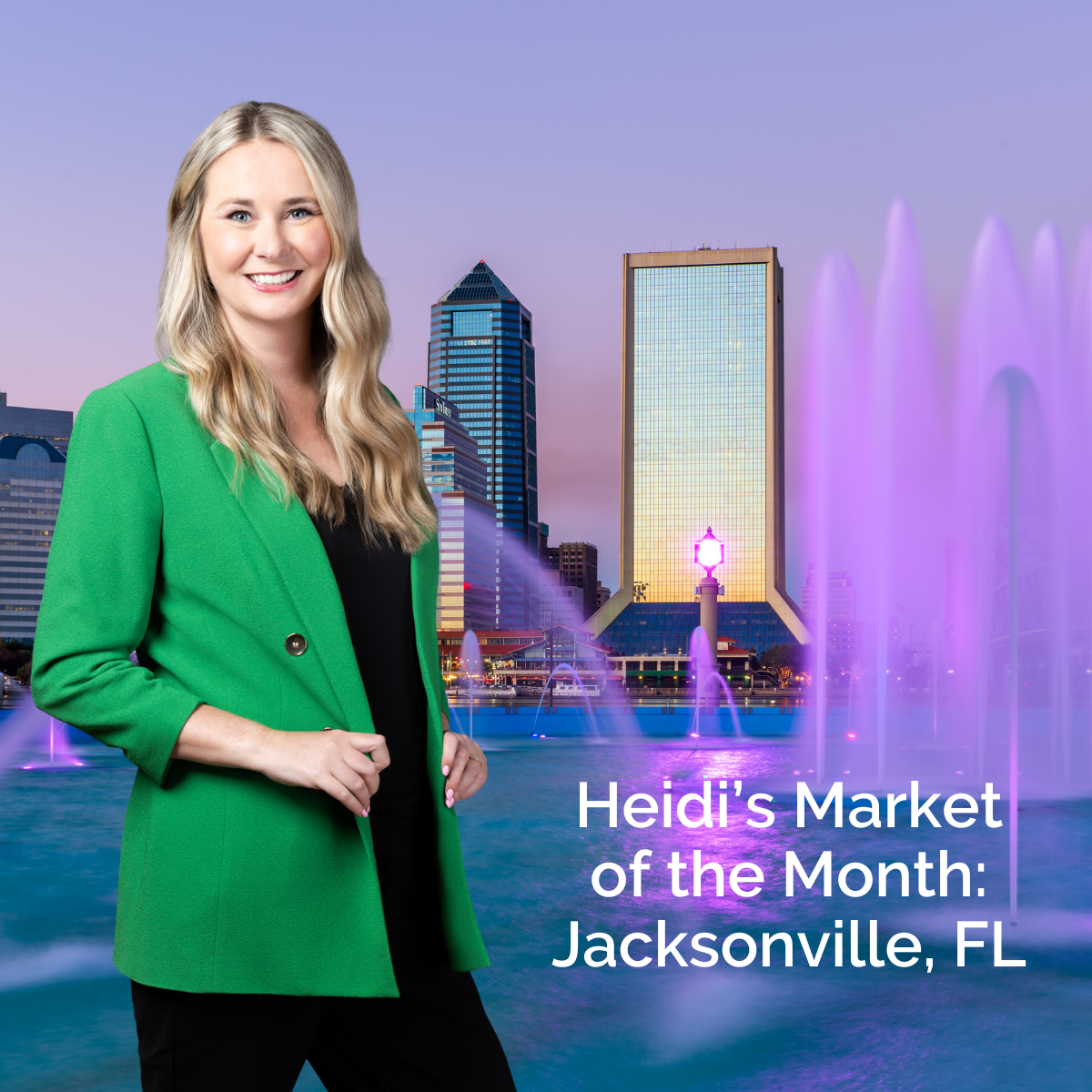Market of the Month - Jacksonville, Florida
By Heidi Nielsen, Vice President of Business Development
Jacksonville, Florida, the largest city by land area in the contiguous U.S., is experiencing a wave of transformative development and economic momentum. Strategically located in Northeast Florida, Jacksonville continues to attract national attention for its logistics infrastructure, waterfront lifestyle, growing tech and financial services sectors, and access to top healthcare systems. The region's favorable business climate, affordable cost of living, and expanding population make it one of the fastest-growing metropolitan areas in the Southeast.

Anchored by institutions like the University of North
Florida, Jacksonville University, and the Mayo Clinic, the city is emerging as
a hub for innovation, education, and healthcare. Jacksonville's growth is being
further fueled by substantial investments in its downtown core, logistics
sector, and port infrastructure, cementing its status as a critical node in the
Southeast's economic network.
A centerpiece of Jacksonville's evolution is the Riverfront
Plaza redevelopment and the Shipyards mixed-use project spearheaded by Jaguars
owner Shad Khan's development arm, Iguana Investments. These large-scale
projects are redefining the city's urban waterfront, introducing a blend of
commercial, residential, hospitality, and recreational space to Jacksonville's
downtown riverfront.
Several major announcements in recent months signal
continued development momentum:
- UF
Health and the University of Florida are planning a new $1 billion
academic health campus in downtown Jacksonville, expected to break ground
in 2026.
- Baptist
Health began work on its new $190 million Emergency and Patient Care Tower
in July 2025.
- Allegis
Group and other tech-forward firms are expanding footprints in the city's
Southside and Baymeadows submarkets, boosting demand for office and
hospitality.
- In
February 2025, the PGA TOUR opened its new PGA TOUR Studios at its Ponte
Vedra Beach campus, expanding and consolidating operations.
Healthcare remains a significant economic driver. In
addition to the growing Mayo Clinic campus and Baptist/MD Anderson
collaboration, Ascension St. Vincent's and UF Health are key players in
Jacksonville's expanding medical footprint. These institutions contribute
significantly to local employment and continue to drive demand for both short-
and long-term accommodation.
Tourism demand is bolstered by the city's beaches, growing
food scene, golf, and cultural venues like the Jacksonville Symphony and Cummer
Museum. Additionally, year-round events, such as the NAS Jacksonville Air Show,
THE PLAYERS Championship, musical festivals, and sporting events, further
support leisure demand. The lack of full-service hotels and sufficient meeting
space in the market somewhat limits group demand. The Prime F. Osborn III
Convention Center only features 78,000 square feet, making Jacksonville less
competitive with larger urban convention markets.
Year-to-Date Trends
After 15 months of consecutive twelve-month RevPAR declines,
the Jacksonville market noted a 0.7% growth in RevPAR through June 2025; the
increase was based on a 0.7% increase in occupancy, while ADR remained flat. The
midscale and economy segments saw the highest RevPAR growth. In
contrast, the upscale and upper midscale categories experienced a negative impact
due to the market's inability to absorb new supply in these categories.
New Supply
According to CoStar, thirteen properties totaling
approximately 1,700 keys are under construction in the Jacksonville market,
representing about 5.4% of total inventory. Roughly 1,250 keys across ten
projects are expected to open by year-end 2025. Additionally, two hotels opened
in the greater market in 2025, and six hotels opened in 2024. The most highly
anticipated new project is the proposed 170-key Four Seasons Hotel and
Residences as part of the Shipyards redevelopment. This luxury addition is
expected to be a flagship hospitality offering for Jacksonville once it opens by
year-end 2026. Additionally, it was just announced that a potential Hard Rock Hotel
may be coming to the riverfront—another high-profile development that could
further elevate Jacksonville's hospitality profile, attract national attention,
and drive incremental demand across both the leisure and group segments.
Transactions
Hotel sales activity in Jacksonville remained steady through
May 2025, with seven transactions totaling $45.9 million, all under $15 million
and mostly involving lower-tier properties. In 2024, 16 deals closed for $232.5
million, boosted by the $85.6 million sale of the One Ocean Resort & Spa,
which accounted for over one-third of the annual volume. While Jacksonville's
hotel market is smaller than other major Florida cities, it continues to
attract regional investors, with many transactions driven by upcoming debt
maturities and elevated interest rates prompting owners to divest.
Conclusion
Jacksonville is undergoing a strategic transformation,
driven by high-impact developments, growing healthcare and education anchors,
and increased private investment. The city's expanding infrastructure—from
medical to industrial to hospitality—is aligning with broader population and
economic trends across the Southeast.
While broader capital market conditions may be slowing
transaction volumes, the fundamentals in Jacksonville's hospitality sector
remain strong. New supply is being absorbed effectively, RevPAR is climbing,
and long-term investments in the city's waterfront and downtown core promise to
boost Jacksonville's appeal to visitors, investors, and developers alike. As
key projects like the Four Seasons and Shipyards take shape, Jacksonville is well-positioned
to solidify its reputation as a rising star in Florida's hospitality and
economic landscape.


